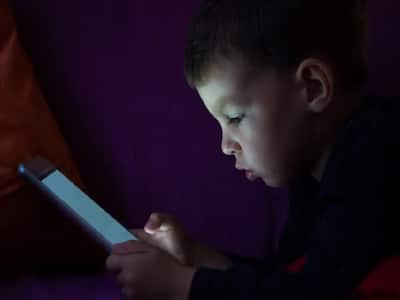
In a world dominated by screens, two mothers, Neha Sharma and Sowmya Jaganath, are on a mission to save children from the negative effects of digital devices.
Today, kids spend fewer time engaging in outdoor activities and more time indoor, either watching TV or using smartphones or tablets. A recent study conducted by the University of Albany and published in JAMA Pediatrics paints an alarming picture, revealing that a staggering 87% of children exceed daily screen-time recommendations. This reality underscores the urgent need to address the potential impact on their mental health, emotional well-being, and physical development. The pressing question that lingers is: How can we effectively compete with the seductive allure of screens?
Two visionary mothers, Neha Sharma and Sowmya Jaganath, have come up with an innovative solution to this problem. Neha and Sowmya, the founders of VOBBLE, say their idea is to shift the focus of children from screen to sound and stimulate their imagination and creativity.

The two mothers share their challenges in keeping their children away from screens. They say, “As mothers, we saw firsthand the challenges that parents faced in reducing screen time for their children (especially during the pandemic). We researched and learned that excessive screen-time has proven to cause learning and psychological issues with young kids, now and later in their lives.”
How reading and audiobooks benefit children
They explain: The common thread between reading and audiobooks lies in their capacity to enrich language skills, expand vocabulary, and cultivate vivid landscapes of imagination. In a contemporary world often overwhelmed by digital screens, these unassuming yet profoundly effective tools provide a sanctuary where young minds can plunge into narratives, nurturing qualities like curiosity, empathy, and independent thinking, which are invaluable for lifelong personal development. Moreover, the positive impact of reading and audiobooks transcends the boundaries of the classroom. Numerous studies have revealed that children who are enthusiastic readers tend to exhibit elevated levels of empathy and emotional intelligence. These qualities are essential for constructing meaningful relationships and successfully navigating the intricacies of real-world interactions. Additionally, exposure to a wide array of perspectives and experiences through literature serves to broaden their horizons, fostering open-mindedness and adaptability an indispensable trait in today’s ever-changing society.
Audio books help engage the vivid imaginations of young children. It achieves this through immersive audio experiences that encompass rich soundscapes, engaging dialogues, and authentic children’s voices, all working harmoniously to transport young listeners into realms of exploration and learning.
Other screen-free ways to entertain and educate your child
Neha and Sowmya agree that their approach to reducing children’s screen time would be prioritizing the value of authentic playtime and meaningful family interactions. They advocate for encouraging habits such as reading physical books, and participating in sports and activities that promote teamwork and physical engagement.
Here are a few more suggestions from the two mothers:
Neha’s Tips:
READ RELATED: Transform Your Diet: 7 Foods You Should Remove for Better Health
- Joy Jar: Collaborate with your child to create a joy jar, a delightful vessel adorned with colorful slips of paper bearing fun ideas. When free moments arise, your child can draw a slip from the jar, sparking spontaneous adventures like picnics, treasure hunts, silly dance parties, or even “make-believe” escapades such as exploring enchanted forests or swimming with mermaids. This hack encourages creativity and nurtures a boundless imagination.
- Audio Journaling: Introduce the concept of audio journaling to your child, replacing traditional writing with recorded thoughts, feelings, and daily adventures using a digital recorder or smartphone. This novel practice not only enhances communication skills but also fosters reflection. With each recording, families grow closer, gaining profound insights into emotions and experiences, forging enduring memories.
Sowmya’s Tips:
- Audio Quiz Shows: Elevate mealtime to an enjoyable and educational experience with captivating audio quiz shows. Gather the family around the table, and let children answer questions and ponder riddles, igniting curiosity and knowledge. This delightful activity not only enhances the dining experience but also fosters cherished family bonding moments.
- Sock Puppet Theater: Nurture storytelling skills by embarking on a creative journey with old, mismatched socks. Collaborate with your child to decorate these socks with art and craft materials, crafting unique characters with button noses, eyes, and woolen hair. Together, invent a story, then hang a blanket over a doorway, and let the puppet show commence!
These imaginative activities offer children opportunities for growth, learning, and enjoyment, they add.
Q. What has been the feedback from parents who have embraced your platform for their kids?
Parents truly empathize with the screen problem and hence the response and feedback has been incredible. Through various events, we’ve witnessed parents observing their children engrossed with the stories – listening, drawing, enacting out the characters. They are relieved to see their kids screen-time reduction especially on occasions like traveling, in restaurants, while eating or during bedtime. Parents also get a much-needed guilt-free break for themselves, while their child surrounds themselves in a world of stories and imagination.
Q. What are your future plans?
Our main focus is to build the best possible product experience in kids audio, together with kids and parents. We also believe in growing the kids’ audio category and will continue to do so through partnerships and collaborations in India and around the world. We are also in talks with schools to encourage auditory learning.
Take Note: The World Health Organization recommends no screen time for children under 2 and no more than one hour of screen time a day for children aged 2 to 4.
Total Wellness is now just a click away.
Follow us on
Don’t Miss Out on the Latest Updates.
Subscribe to Our Newsletter Today!
window.addEventListener(‘load’, (event) => {
$(‘#commentbtn’).on(“click”,function(){
(function(d, s, id) { var js, fjs = d.getElementsByTagName(s)[0]; if (d.getElementById(id)) return; js = d.createElement(s); js.id = id; js.src = “//connect.facebook.net/en_US/sdk.js#xfbml=1&version=v2.3”; fjs.parentNode.insertBefore(js, fjs);}(document, ‘script’, ‘facebook-jssdk’));
$(“.cmntbox”).toggle();
});
});









